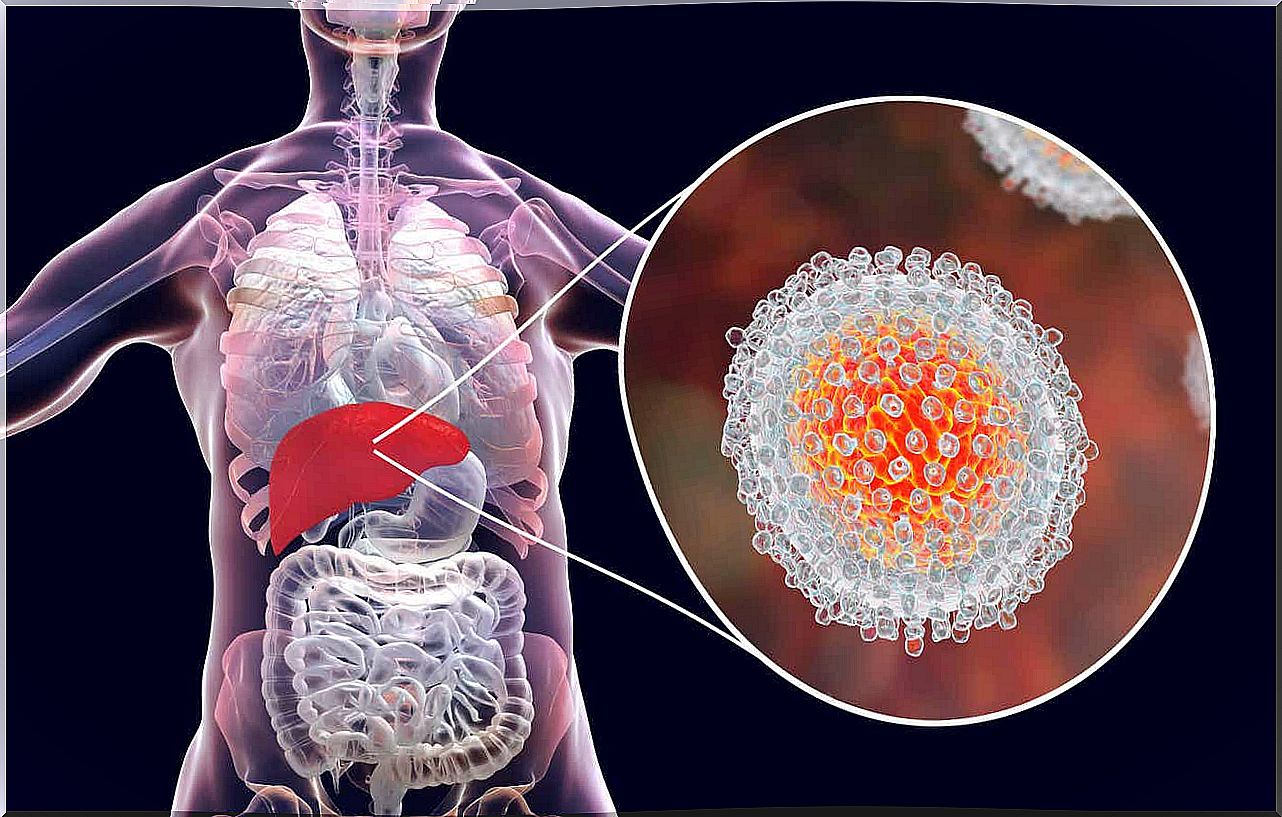Hepatitis C During Pregnancy

Although only a small number of people suffer from complications caused by hepatitis C, it is a public health problem. Hepatitis C is a globally widespread viral infection. In addition, it is transmitted through the bloodstream, especially between addicts who inject drugs and share syringes.
Although pregnant women in most cases do not usually have complications, in the case of chronic infections, some women and infants may experience additional difficulties. If you want to learn more about this topic, keep reading.
What is hepatitis C?
As the name suggests, hepatitis C is an inflammation of the liver tissue. According to an article from the World Health Organization (WHO), hepatitis C can cause acute or chronic infection. But most people who suffer from this show no symptoms.
However, the fact that people do not show symptoms does not mean that their situation is not complicated. In fact, when people suffer from a chronic infection, it can lead to liver cancer. According to the WHO, 71 million people suffer from chronic hepatitis C infections.

Although this virus is spread worldwide, it is more common in some parts of Europe and the Eastern Mediterranean. This is even more common among groups of people who inject drugs.
How is hepatitis C transmitted?
Blood is the fluid that transmits this virus. According to an article from the magazine Offarm , these are the most common transmission methods:
- Transfusions
- Hemodialysis
- Depending on intravenously administered drugs
- Organ transplantation
- Accidents at work with caregivers
- Tattoos, piercings and acupuncture
In addition, expectant mothers can transmit infections to the fetus through vertical transmissions.
According to an article by the Argentine Federation of Societies of Gynecology and Obstetrics , between 1 and 2.5% of pregnant women have this infection in the United States. As a result, this increases the number of vertical transfers.
How do I know if I have hepatitis C?
From a clinical point of view, most patients experience no symptoms, especially in the case of new infections. When patients show symptoms, the incubation period is already over. This can happen between 2 weeks and 6 months. The following are the most common symptoms:
- Yellow skin color (jaundice)
- Loss of appetite
- Nausea and vomiting
- Abdominal pain, especially in the upper right region (right hypochondrium)
- Fever
- Dark urine
- Pale or light stools
If you have any of these symptoms , you should see your doctor as soon as you can to get a diagnosis. However, in many countries it is important to take this test regularly, especially during prenatal check-ups.
These studies include blood tests, which include antibody testing of the blood. If the antibody levels are high, there is enough evidence that there is genetic material for the virus in the blood.
If the results are positive, doctors must evaluate the severity of the damage to the liver. Then they can ask for magnetic resonance imaging, ultrasound elastography or liver biopsy, according to specialists from the Mayo Clinic in a study.
Treatment of hepatitis C during pregnancy
During pregnancy, treatment with hepatitis C varies depending on the severity of the liver damage and the symptoms the patients have. According to an article in the Journal of Gastroenterology of Peru , Therapy has many objectives in this case:
Pregnant women with hepatitis C must be very careful when damaging their liver.
In addition, they should also control the effects of the virus and reduce the possibility of transmitting it to their children. “
For this reason, it is very important to avoid medications that may affect the liver. This will prevent complications during the infection. Women suffering from cirrhosis (one of the consequences of chronic hepatitis) may experience some difficulties that require emergency treatment.
These treatments may include medication to avoid blood clotting or even endoscopic or surgical procedures to treat varicose veins that can cause internal bleeding.
Hepatitis C during pregnancy: How it affects you and your baby
Many women can go through their pregnancies without noticing that they are suffering from hepatitis C. As we have mentioned before, the risk of developing complications is quite small. According to the previously cited articles, however, chronic infections can in some cases lead to cirrhosis or even cancer.

Although vertical transfer is possible, there is so far no evidence to suggest that scheduled C-sections or breastfeeding interruptions would prevent this from happening.
A study called Transmission of the virus of hepatitis C al recién nacido (Hepatitis C virus transmission to the newborn) says that transmissions can occur during childbirth, whether it is a natural birth or a cesarean section. In addition, if the mother suffers from HIV, the chance is higher.
According to an article from Gastroenterología y Hepatología (Gastroenterology and Hepatology) , chronic infections from hepatitis C do not cause additional risks during pregnancy. If the mother is stable, the worst that can happen is that the child becomes infected.
Although acute infections can cause alarming symptoms, there is little chance of suffering from a chronic infection that can really affect a child’s health. To detect this, it is very important to visit the doctor often.
Medical check-ups are crucial
Although hepatitis C does not cause major health problems, it is important to know that it can lead to certain complications.
Therefore, people should have access to screening tests or be able to go to the doctor if they notice any of the symptoms mentioned earlier. In this way, they get a correct diagnosis and receive treatment in time.









